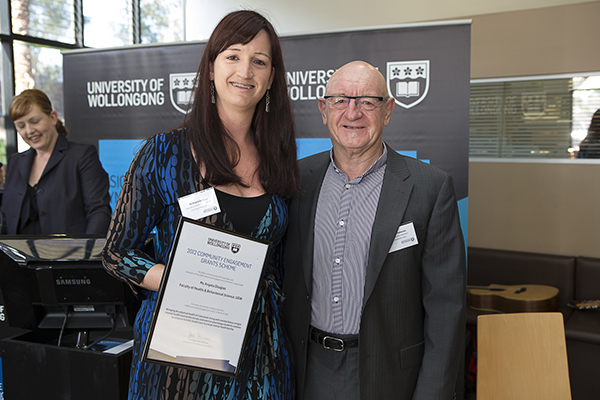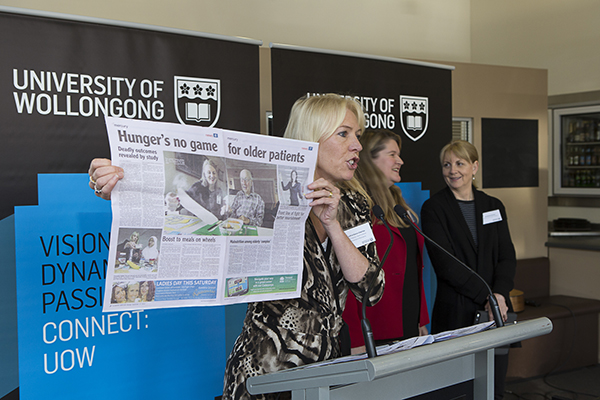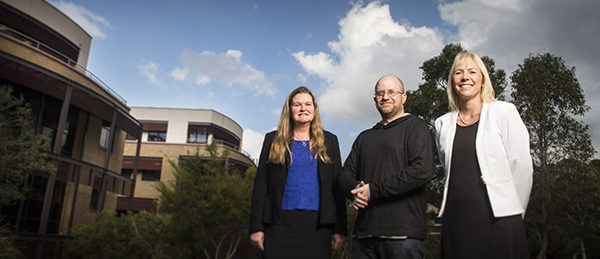May 11, 2015
Bright ideas and community connections
Applications open for funding program that connects great ideas with the community.
Over a decade, the Community Engagement Grants Scheme has helped dozens of staff and students connect with the community in a meaningful way.
The Community Engagement Grants Scheme (CEGS) is an innovative program that supports projects that will benefit the local community. With the objective of providing funding to staff and students for educational, research or outreach projects that partner with community organisations and groups, CEGS was launched in 2005. Since then, CEGS has awarded more than $450,000 to 54 projects.
| CEGS 2015 |
|---|
CEGS projects have impact - they address key challenges in our communities and take action to create real and measurable outcomes. They also aims to create projects that are ongoing and have sustainable outcomes. Applications for CEGS 2015 close 5pm, Friday, 7th August 2015. |
True Steel
Youth unemployment is a challenge faced by modern Australia.
To help tackle the problem at a local level, a multidisciplinary team of UOW staff, with community partners and the Hope Centre in Warrawong, have developed a program to help youth acquire some of the skills they need to participate in the workforce.
Targeting low-socioeconomic individuals, the eight week True Steel program teaches social and work-related skills to increase the employability of participants.
“We need to break the cycle of disadvantage. Many of the young people involved in this program aren’t the first in their family to experience unemployment. Disadvantaged youth are often unable to access appropriate training, mentoring and support to break out and claim the positive futures they each deserve,” project leader Craig Napier said.
“This program is helping to overcome these problems.”
A program run by the Hope Centre is helping young people break down barriers, and enter the workforce.
Posted by WIN News Illawarra on Tuesday, 31 March 2015
Of 140 applicants, 21 were selected for the program, some of whom suffer from mental and physical illnesses. Of the first cohort to graduate from the program in April 2015, 75 per cent had lined up employment.
| UOW Project team |
|---|
| • Mr Craig Napier • Ms Wendy Meyers • Dr Lynne Keevers • Paul Vaartjes • Professor Valerie Harwood • Dr Lisa Thomas • Dr Samantha McMahon |
The program’s success has been recognised by the government. On 15 April, the Hon Scott Morrison MP announced that the government would invest $110,000 in the continuation of the project with $40,000 to establish a training suite and $70,000 to operate a pilot employment training program.
“The brand new training suite will create the capacity for the Hope Centre to deliver an eight-week training course in hospitality, retail, cleaning, warehousing, and customer service,” Mr Morrison said.
“The training suite and pilot program will make a concrete difference to the lives of young people in the Illawarra and complements the work which the Hope Centre has been doing for years in support of vulnerable people.”
The Hope Centre hopes to have 80 young people graduate from the program each year.
ACTive
Another CEGS project that has worked with some of the community’s most vulnerable members is ACTive, a structured lifestyle intervention program to improve the health and wellbeing of people living with severe mental health illness.

Angela Douglas with former Senior Deputy Vice-Chancellor Professor John Patterson
The ACTive program was a collaborative partnership program with the Shellharbour Mental Health Rehabilitation Unit (MHRU). A pilot program was trialled in 2012, and in 2013 a complete 16-week program was integrated as part of the weekly structure of the MHRU, with the support of the Illawarra Shoalhaven Local Health District (ISLHD) and UOW staff and exercise physiology students.
| Active |
|---|
• The MHRU staff team was named a top-3 finalist in the NSW Health Nursing and Midwifery Excellence Awards in 2013 for their initiative in implementing the ACTive program. |
“People living with a severe mental illness can have an overall life expectancy up to 25-30 years lower than the general population, largely due to poor physical health,” associate lecturer in exercise physiology Angela Douglas, one half of the ACTive project leaders, alongside Alex Gagan, nurse educator in the ISLHD mental health service, explained.
“The adverse side-effects of common antipsychotic medications, along with the increased propensity for smoking, physical inactivity and poor diet contributes to risk factors such as substantial weight gain, elevated blood pressure and blood glucose. This leads to higher rates of type 2 diabetes and heart disease. Healthy lifestyle programs, especially those incorporating structured and individualised approaches to diet and exercise, can help address this current disparity in overall health for those living with a mental illness, but currently there isn’t necessarily the support there to help people achieve this.”
As part of the program, individuals at the Shellharbour unit were offered supervised exercise with individualised programs, weekly health education sessions, access to individual dietary consults, and daily MHRU staff-led strategies to help them achieve their health goals.
Soon after it was launched, ACTive saw positive changes in people partaking in the program, ranging from increased engagement with healthy behaviours on the unit, weight loss or weight maintenance, increased physical function, and self-reported positive effects on daily mood and energy levels.
“The program was really valued as a part of the MHRU by both the individuals and the staff, and demonstrated the potential effectiveness of including these types of programs into mental health service models,” Ms Douglas said, adding that students also benefited from the program.
“Students volunteered to be involved with ACTive, and unanimously reported how invaluable the experience was in developing their knowledge, skills and interest for working in mental health.”
Meals on Wheels
Being dietitians, Associate Professors Karen Charlton and Karen Walton know that a well balanced diet is important for everyone, regardless of age. They are also aware of the many difficulties that older people face in meeting their dietary requirements due to such things as smaller appetites, illness, reduced incomes, and decreased independence and mobility.

Karen Charlton (left) speaking at a CEGS event
The pair has spent much of their careers educating others about the importance of nutrition, and for years have been reaching out to relevant communities to promote healthy eating habits. They have dedicated much of their time to understanding and developing solutions to address the high prevalence of malnutrition among older adults.
The Community Engagement Grants Scheme (CEGS) has supported these two academics to partner with the not-for-profit Meals on Wheels organisation in the Illawarra. Their first CEGS grant in 2010 enabled them to assess the nutritional status of clients of Meals on Wheels (MOW).
“We found that clients were only meeting their nutritional requirements if they ordered and consumed all three parts of a meal (soup, dessert and main meal). Many clients only order some parts of a meal and may need additional ways to boost their intake,” Professor Charlton said.

Karen Walton, Shawn Burns and Karen Charlton, supported by a CEGS Impact Grant, helped MOW clients to tell their own stories.
“We tackled this problem by simply introducing ‘snack packs’ that can be eaten alongside other meals. This helped improve energy and protein intake and resulted in weight gain over as short a period as four weeks.”
A further CEGS grant in 2012 allowed the team to continue its work, this time partnering with Flagstaff Fine Foods, a social enterprise company that is a supplier of meals to MOW. In that project, mini meals (smaller meal options developed to address poor appetites) were fortified and shown to be an effective strategy to increase nutrient intake.
In 2013, the work was further funded through a CEGS Impact Grant. Through audio storytelling, MOW clients, volunteers and service managers shared their experiences relating to social, cultural and health related issues. A moving piece, Food and Friendship: why meals need wheels highlights the value of the service that has as its motto “More than just a meal.”


